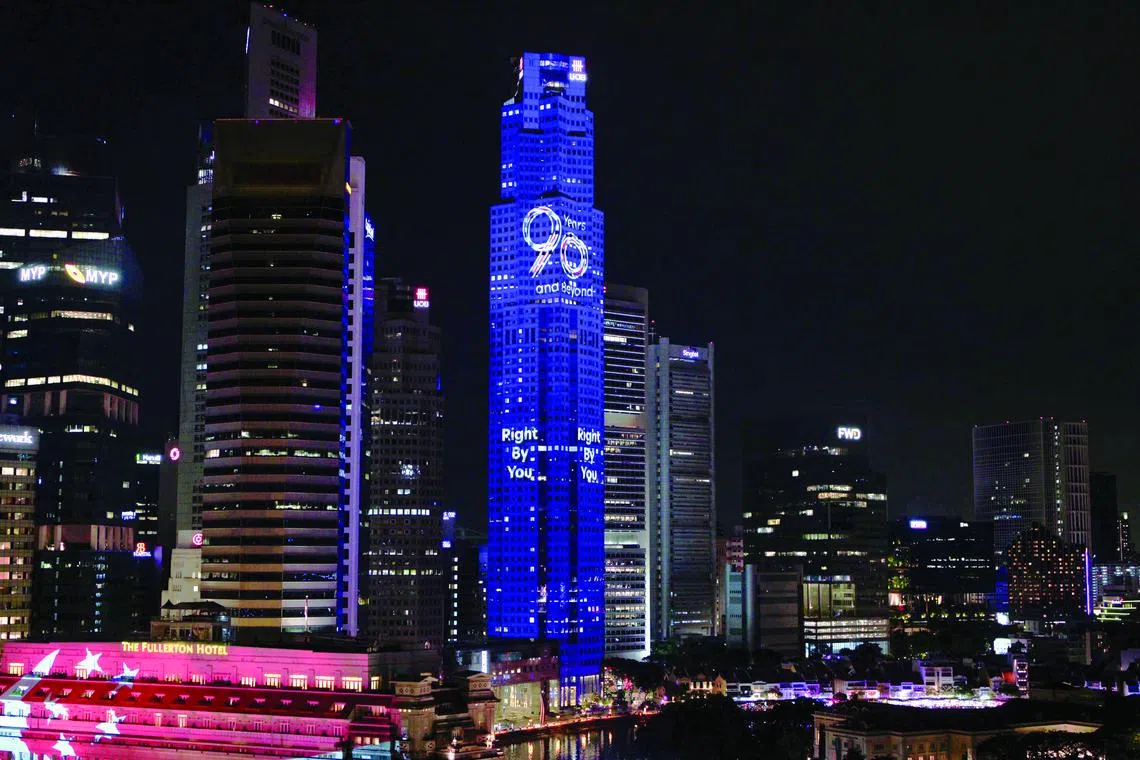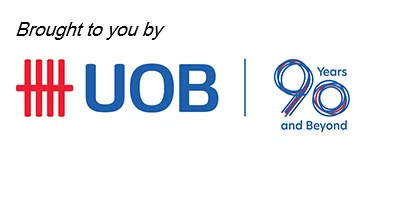UOB aims to further grow and serve in Singapore and Asean
CEO Wee Ee Cheong advocates perseverance and humility as the bank looks beyond its 90th anniversary
EVEN as Singapore is celebrating its 60th year of independence, UOB is marking an equally significant milestone with the 90th anniversary of its founding in 1935.
Back then, amidst the uncertainties of the Great Depression, a group of seven businessmen led by Datuk Wee Kheng Chiang founded a bank to serve the merchant community in Singapore.
Then, it was called the United Chinese Bank. It started operations in Raffles Place, the centre of all Singapore’s commercial activities. Soon after, it followed that up with a branch in Beach Road.
Growing outside Singapore
In 1965, the year of Singapore’s independence, the bank took on its present name, that of United Overseas Bank and as the young country grew apace, UOB flourished in tandem.
The bank’s iconic red five-bar logo was launched. UOB opened its first overseas branch in Hong Kong and then Tokyo.
The 1970s and 1980s marked a period of rapid growth which saw the bank making a slew of acquisitions.
Navigate Asia in
a new global order
Get the insights delivered to your inbox.
Datuk Wee’s son Dr Wee Cho Yaw led the bank in this phase during this period, establishing and consolidating the bank’s market position in Singapore and Southeast Asia.
First up was Chung Khiaw Bank in 1971, which deepened UOB’s presence in Malaysia. Next was Lee Wah Bank in 1972, boosting UOB’s presence across Singapore and Malaysia.
The next decade saw the acquisition of Far Eastern Bank in 1984, swiftly followed by Industrial and Commercial Bank in 1987.
By the end of the 1980s, UOB had the distinction of being one of the four largest banks in Singapore with an extensive presence across Singapore and Malaysia.
2000s and Singapore’s largest bank takeover
A second major wave of growth took place in the early 2000s, when Singapore’s local banks were urged to merge to achieve economies of scale and increase their competitive strength.
In 2001, UOB made headlines for its acquisition of Overseas Union Bank from the Lien founding family in what remains Singapore’s largest bank takeover.
The S$10 billion acquisition cemented UOB’s position as a dominant banking entity in the region, increasing its assets to over S$112 billion and extending its network to 98 branches.
Against this backdrop, there was a smooth passing of the leadership baton to the third generation, with the appointment of Mr Wee Ee Cheong as CEO in April 2007.
A focused Asean strategy and the mega Citi deal
Mr Wee says: “We had started planting seeds, acquiring banks in the region to build scale, focusing on the neighbouring Asean markets where we have a competitive edge. Our Asean focus isn’t just a strategy; it’s part of who we are. We live here and grow here. We are a part of this region.”
A key aspect was recognising the growing importance of foreign direct investment (FDI) in Southeast Asia and accordingly a dedicated FDI advisory unit was set up in 2011.
Since then, more than 5,000 companies have tapped UOB FDI advisory services to expand overseas, especially into Asean.
That has more than paid dividends. In the past five years, companies supported by the advisory unit have pledged to invest more than S$50 billion, enabling the creation of more than 250,000 job opportunities across the region.
Ramping up growth
In January 2022, in the depths of the Covid-19 pandemic when investors were running scared, UOB had the derring-do to unveil yet another transformational deal. It acquired the consumer banking business in Indonesia, Malaysia, Thailand and Vietnam of US financial giant Citigroup for S$4.9 billion.
Instead of acquiring more branches or more infrastructure in a traditional deal, this was a savvy alternative that enabled UOB to double its Asean customer base and accelerated its regional growth by five years. UOB’s total customer base now exceeds 8.4 million.
The expanded customer base drove cross-sell synergies, by uplifting customer spend, growing deposit balances and expanding the wealth management business. With an expanded customer base and a regional one at that, more event organisers wanted to partner UOB for its customer base. It cemented UOB’s leadership as the top card issuer for Visa and MasterCard in Asean.
And in 2024, UOB’s access to that customer base was the winning factor behind it clinching the deal to be the exclusive credit card for the Taylor Swift set of concerts. With Singapore as the sole Asean stop, fans around the region rushed to sign onto the cards to get first dibs on tickets.
While this investment came nearly two decades after the OUB deal, Mr Wee explains that the wait was down to discipline. “There was pressure for us to acquire along the way, but we were disciplined. It was the perfect fit at the right time. It was a rare opportunity to scale up in four target markets at one go.”
The ‘one UOB’ vision
From just one branch in Singapore, UOB has nearly 500 branches in 19 markets across the world now.
Given its various acquisitions over the decades, UOB needed to assimilate these acquired bank employees and customers into a unified entity. Otherwise, it would have been just “a collection of banks”.
Mr Wee says: “I started to put a lot of effort over the last decades to create a common platform for all the entities that we bought. With the common platform, it will create a seamless experience for our customers, and enable them to access the market more speedily. This allows us to scale up quickly across the franchise.”
It was not just colleagues and internal systems and processes which needed to be integrated.
Over the past decade, UOB has ploughed in over S$800 million to build an integrated regional platform to build capabilities in regional payments, cash and trade platforms for its wholesale business.
Long-term approach
Underpinning UOB’s overall strategy is its long-term approach. Mr Wee says: “When you think long term, you will act in a responsible manner. We believe in pursuing growth with stability in a measured and disciplined manner, instead of being focused on short-term gains.”
“Being long term means that we always anticipate our customers’ needs. And we invest in capabilities for the future so that we can grow together with them.”
Even if the world is getting more challenging, Mr Wee maintains that “we are here to help our customers navigate complexities; we believe in building long-term relationships with our customers, where we help our customers grow”.
A disciplined approach to acquisitions, an integrated platform and a long-term approach have paid off handsomely for the bank. 2024 continued to be a highly profitable year for UOB and in February 2025, the bank reported that it had made a record profit of S$6 billion for the financial year ended Dec 31, 2024.
What’s more, the UOB share price also hit an all-time high of S$38.67, giving the bank a market capitalisation of close to S$62 billion.
Creating impact in the community
Even as the bank continues to thrive financially, Mr Wee recognises the importance of driving corporate social responsibility efforts in the areas of art, children and education. He says: “Education represents an investment in our collective future across the Asean region. There’s a Chinese saying: ‘十年树木,百年树人’, meaning that it takes a long time to nurture people with which a good education is vital.
This year, as part of its 90th anniversary, UOB has pledged a total of more than $120 million for a variety of educational programmes which will impact about 250,000 students and children across Asean over the next few years.

Among the ongoing efforts, there was a S$30 million commitment in early 2025 to programmes aimed at supporting the education of disadvantaged children and students in Singapore and across Southeast Asia. In April, UOB and the Wee Foundation announced that they have pledged a combined gift of S$110 million to Nanyang Technological University.
Other efforts include the UOB FutureGen Scholarship Programme that will provide pre-tertiary scholarships to students from the region to study in Singapore. The bank is also partnering with a leading education technology platform based in Indonesia to provide children across Asean with a headstart at school.
During UOB’s 80th anniversary in 2015, UOB also set up a scholarship, the Wee Cho Yaw Future Leaders Award, which provides tertiary education for less privileged children. To date, the scholarship has supported more than 150 students studying in local tertiary institutions.
Preserving UOB’s heritage while investing for the future
Having banked SMEs and businesses in the community right from its founding, Mr Wee says its roots as a SME bank, means that it understands the pain points of its SME customers, and supports SMEs on their journey.
Mr Wee says: “We bank the entire supply chain, not just with individual segments. For example, we bank the entire value chain on electric vehicle (EV) production, starting from the nickel miners to the battery suppliers.”
The banker at heart insists that UOB will continue to help its customers seize opportunities.
Just as with the Johor-Singapore Special Economic Zone initiative, UOB is very much an early mover in moving decisively to support companies who wish to expand there.
As UOB looks beyond 2025, Mr Wee turns philosophical.
He says: “As a homegrown bank that was founded before Singapore’s independence, we have been part of the nation’s transformation, not just as a financial institution, but as a partner in progress.”
The bank recently opened a gallery at UOB’s main branch at Raffles Place commemorating the rich history and milestones of the bank from its founding in 1935.
There are even plans for boat rides along the Singapore River which will allow investors and tourists alike to appreciate UOB’s journey – in line with the country – from fledgling bank to Asean giant.
For Mr Wee, UOB’s people – there are some 32,000 staff across Asean – are very much at the forefront of his mind.
There are many challenges facing the banking industry, be it geopolitical challenges or technological disruption. Mr Wee says: “While some people may be a little fearful of AI, thinking that it may take over jobs, I tend to believe that technology is a tool that we should use to see how it can improve our productivity, to help people to grow.”
With a solid foundation in place at the bank, the challenge will be how to sustain the UOB culture and ensure a lasting legacy.
He says: “I think it’s important to engage our people. We discuss (things) openly and we do the right thing for the organisation. We take a long-term view, guided by our vision.”
As he surveys the bonsai trees outside his office, some of which he has tenderly nurtured over the past two decades, he uses their symbolism for longevity and wisdom to describe his hopes for UOB.
Mr Wee says: “We are blessed to have survived for 90 years. But we cannot take it for granted. We have to deepen our Asean base and this will determine how we grow for the next 10, 15 years. It means we must continue to persevere and to be humble. And when you go into another country, people will welcome you.”

Copyright SPH Media. All rights reserved.

